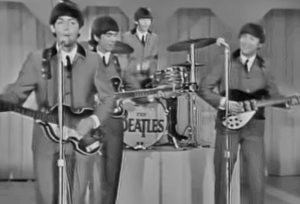Rock history often paints The Beatles as peace-loving icons who transcended rivalry, but even the most harmonious band in the world had its share of discord. Beneath the charm and the wit, there were moments when John, Paul, George, and Ringo didn’t hesitate to speak their minds about their peers—or return fire when others took aim at them.
Some of these spats were fueled by artistic pride, others by personality clashes, and a few by pure misunderstanding. The Beatles’ rise to global dominance naturally invited comparisons and criticism, sparking verbal duels that still fascinate music fans decades later. Whether playful or pointed, their exchanges with fellow artists revealed a competitive streak behind the band’s polished image.
From subtle digs to open confrontations, the Fab Four’s feuds remind us that even legends weren’t immune to ego or rivalry. These moments didn’t tarnish their legacy—they made it more human. Here are three memorable times The Beatles clashed with other music legends and showed that even peace-and-love advocates could throw a lyrical punch or two.
Phil Collins and the Pain of Meeting an Idol
Few things sting more than meeting your heroes and walking away disappointed. For Phil Collins, a lifelong Beatles fan, that moment came in 2002 when he met Paul McCartney at a Buckingham Palace event. Collins brought along a first edition of The Beatles by Hunter Davies, eager to have it signed by one of his idols. Instead of a warm exchange, Collins recalled feeling dismissed by McCartney, who reportedly quipped to then-wife Heather Mills, “Oh, Heather, our little Phil’s a bit of a Beatles fan.”
That single remark apparently changed how Collins viewed McCartney forever. “You fck, you fck,” he admitted thinking to himself in an interview with The Sunday Times. He described McCartney’s demeanor as one that carried a quiet arrogance—as if talking to him was supposed to feel like a privilege. The experience clearly left a mark, as Collins would go on to share the story in multiple interviews over the years.
While McCartney never publicly addressed the incident, the encounter highlighted the tricky nature of meeting one’s heroes. Collins’ bitterness may have been one-sided, but it resonated with fans who have faced similar disillusionment. Even if McCartney meant no harm, the moment stands as a reminder that perception—and tone—can shape a legend’s reputation just as much as their music.
John Lennon vs. Blood, Sweat & Tears
John Lennon’s bluntness was part of his charm, but it also made him one of rock’s most outspoken critics. In a 1971 Rolling Stone interview, Lennon didn’t hold back his disdain for the jazz-rock fusion band Blood, Sweat & Tears. “I don’t like the Blood, Sweat & Tears sht,” he declared. “I think all that is bullsht.” His comment reflected a deeper frustration with the direction popular rock was heading in at the time—away from raw authenticity and toward musical “excellentness,” as he mockingly called it.
For Lennon, music was meant to be direct and emotional, not polished or overly technical. His words were a clear jab at bands who, in his eyes, prioritized musicianship over meaning. While Blood, Sweat & Tears had scored major hits and critical acclaim, Lennon’s critique suggested he saw them as emblematic of rock’s drift toward pretension.
The remark didn’t spark a public feud, but it did reinforce Lennon’s reputation as rock’s fearless truth-teller. Even after The Beatles’ breakup, he wasn’t afraid to call out what he saw as phoniness in the industry. His sharp tongue could bruise egos, but it also gave insight into his lifelong defense of music’s emotional core.
George Harrison Takes a Swing at The Hollies
George Harrison was often the quiet Beatle, but when he did speak his mind, he didn’t mince words. One of his most surprising moments came in 1965 when he publicly criticized The Hollies’ cover of his song “If I Needed Someone.” Instead of polite approval, Harrison dismissed their version as “rubbish.” In an interview with NME, he said, “The Hollies are all right musically, but the way they do their records, they sound like session men who’ve just got together in a studio without ever seeing each other before.”
The remark was shockingly blunt, especially considering the tight-knit nature of the British Invasion scene. The Hollies were contemporaries of The Beatles and had enjoyed their own success, so being called out so harshly by Harrison stung. Reports suggest The Hollies were offended by the jab, and the tension lingered for years.
Harrison’s critique wasn’t entirely baseless—he valued sincerity and cohesion in performance, and perhaps he felt their rendition lacked both. Still, the public nature of his comment made it feel like an unnecessary punch. It revealed that even The Beatles, who inspired countless bands, weren’t always generous toward those following in their wake.
